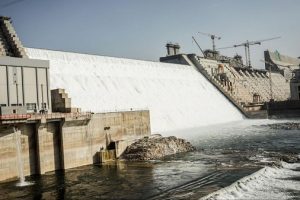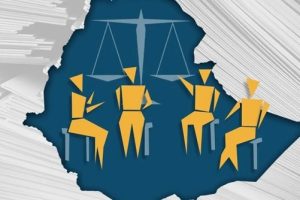BY MENGESHA AMARE
Ethiopia is purely left with less than four months to conduct the 6th national elections. Political parties, hence, started campaigning to introduce their manifesto, programs and bylaws to the general public, commonly the electorate, as much as possible to win public confidence thereby unloading votes.
The wedding to be concluded between Ethiopia and its bridegroom, the winner party, is the long awaited one in which parties are expected to be free participants, and electorates can in turn cast votes without intimidation and hustling.
Taking all this fact into account, this writer attempted to listen to the heart beats of a cross section of electorates and evaluate at what level they are in terms of preparing themselves to cherry-pick the party they would prefer.
The first person to whom the writer talked is Silas Beyene. She is a businesswoman around Megenagna. She said, “I have identified which party to give vote and readily waiting for the date of election though election campaigns just start.
Parties must live up to their oaths made at the time of pre-election to be well trusted in and continue leading the country if they win. However, some do good things before they are elected, but turn upside down their promises and start tyrannizing citizens in favor of their comfort and personal gain. This culture needs to get dried.”
As to her, in some circumstances, winners are significantly altered either by messages that reinforced their biases or by information challenging their prior beliefs.
According to Silas, people are all the time heard of saying ‘this party is better to lead,’ ‘that party is by far good for the public and the likes. As to her, so long as the party or coalition of parties are committed enough to bring about peace and security, development and progress as well as equally treated citizens and provide them with equal opportunities for competition and follow merit based hiring workers, she doesn’t’ care to which tribe or clan the party predominantly belong. “This could by no means be our concern,” she added.
Silas further said that on many issues the public does not have fully formed and unambiguous views. This does not mean that there is anything wrong with the public.
In a democracy, citizens are typically more concerned with some matters than others, and the majority of the citizens of the nation are not continuously engaged in public affairs.
Certain obscure questions of public policy, while important, will never engage a mass public. Polling that does not deal with these basic facts of democratic life is producing something other than real information.
She said, “I have sometimes heard of people complaining that the ones are working against the public to snatch public properties and nation wealth considering that it is their turn.
This is not the right sentiment as citing the intention of some finger counted individuals neither represents the entire society coming out of the tribe from where some self-centered emerge nor helps the nation get grow.”
Election is like a purifying machine to sieve which is preferred and who is not, she said adding that so the upcoming election has to be a real and legitimate one to help people confidently pull their representatives towards office.
Another electorate to whom the writer talked is Challa Itana residing around Ayat. He is a building contractor. According to him, Ethiopia is believed to conduct fair, free and credible poll this year as it has made, in its history, the election board independent and free from party manipulation.
As to Challa, politicians and interest group leaders can shape and manipulate public opinion to build broad nominal support for policies mainly serving the interests of their core supporters.
This natural dynamic of politics has, in due course of campaigning, dramatically increased the artificiality and disingenuousness of much public discourse. Be that as it may, the electorate should weigh the practical deeds of the respective parties encircled in the competition.
He further stated that balloting is a tool, not a standard. The electorates do acknowledge how important it has become in building a democratic culture.
Besides, they are expected to urge politicians and political parties to remember the great difference between the idea that the people should rule and the use of polls to determine public policy or manipulate the people’s will. Undoubtedly, everyone agrees with this.
“Frankly speaking, no election was conducted in Ethiopia earlier as untold conspiracies had been carried out and cold water had recurrently poured to public ambition and rosy hope.
It is better to say Ethiopia is going to conduct its first election at the cessation of this year. Electorates have to leave free to cast vote and provide the party with their golden voice and effectively use their card to make their voice heard loud as this is the sole way to get a sigh of relief in the 21st century. Every vote counts!” he said.
Obviously, relationships between citizens and leaders, he said, between public opinion and democratic governance, are complex. Many fear that contemporary politicians too often put their fingers to the wind of public opinion in deciding what policies to advance. Yet the very fragility and ambiguity of public opinion make the use of polls problematic as a direct, dominant guide to formulating public policy.
Haimanot Ayelign, who is a resident of Meri, had also a stay with the writer and said that Ethiopia will open a new chapter using the upcoming elections if utilized all the opportunities about which it will bring.
Everyone should elect the party which is believed to serve public interest as fairly and equally as possible. They are not supposed to cast vote to whom they know and do have a tribal connection or benefit clique.
“Interestingly, sub-national self-governance is on the rise across Ethiopian democracy. This increasing decentralization changes party competition in multilevel governance systems, and has broad implications for voters’ ability to assign political responsibility and to hold politicians accountable. However, this approach shouldn’t be framed in a narrow sense instead it has to be shaped in the sense that it can fortify unity in diversity,” she said.
Concerning the interplay between party competition and dual accountability, the attribution of answerability to the relevant level in multilevel governance systems, it is important to distinguish conceptually between an electoral and a governmental arena.
Whereas dual accountability in the electoral arena is challenged by varying degrees of party system nationalization, the governmental arena is characterized by a concept between the wish for straightforward dual accountability and the need for political stability.
According to Haimanot, the potential challenges in due course of passing through a range of steps to run activities have to be well dealt with in a bid to ensure electoral accountability in ever more institutionally complex systems of graded governance.
Haimanot further said that there is a strong belief that analyzing what citizens think about politics and policy is a genuine contribution to democracy.
It’s especially important in democracies whose politicians claim their mandates from the people and regularly insist that they represent the views and interests of the people. To ask the people, with regularity, for their own thoughts strikes electorates as being both useful and a check on the claims of those in power.
She said, “Individuals tend to accept information that is congruent with their political views irrespective of its objective accuracy, but discard or discount that which challenges their biases.
Does ideological proximity between the individual and political parties determine electoral participation in elections? Does the degree of self-rule of a region affect the interplay between ideological distance and turnout?”
Yes, citizens are more likely to vote when they perceive there is at least one congruent policy option among the party supply, and this happens at both regional and national levels.
What matters here is electorates’ active participation in elections, genuinely and impassively of course, is of significantly useful in determining the future of the nation.
The Ethiopian Herald February 23/2021



